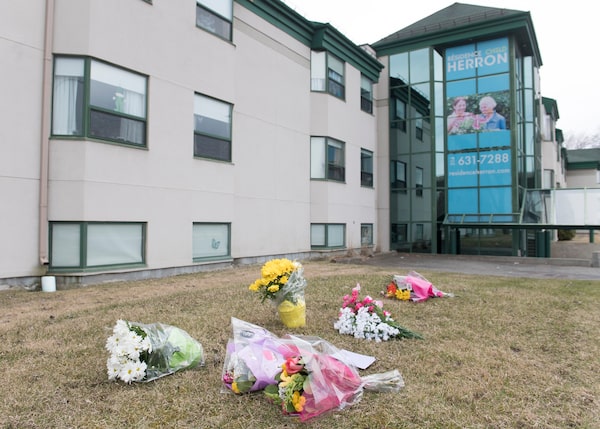
Flowers are shown outside Maison Herron, a long-term care home in the Montreal suburb of Dorval on April 12, 2020, as COVID-19 cases rise in Canada and around the world.Graham Hughes/The Canadian Press
In April, 2020, the COVID-19 pandemic was just beginning to spiral out of control in Quebec. The news headlines were dominated by horrific tales of neglect in long-term care homes, with one facility, Résidence Herron, squarely in the spotlight.
A dramatic exposé in the Montreal Gazette revealed that when public-health officials arrived, they found residents wallowing in urine and feces because their incontinence pads had not been changed in days. Others were dehydrated, starving and disoriented. Most of the staff – overworked, sick and underpaid – had fled.
It was the story that really drove home the severity of the pandemic, and the need for governments to act. A visibly angry Premier François Legault decried the “gross negligence” at the home, where 31 people had died of COVID-19 in gruesome circumstances. (That number later rose to 47.)
A flurry of investigations followed: A coroner’s inquest was announced immediately, then a police investigation, an internal review within the provincial Ministry of Health and Social Services, and an investigation by the provincial ombudsperson.
Last week, a mere 10 months later, the coroner’s inquest opened with some reflective words by coroner Géhane Kamel: “The loss of a human life when it could have been avoided is always a tragedy for loved ones and society. But the indecent and inhuman conditions surrounding those deaths should also be considered.”
But just as the inquiry began, it was derailed. Lawyers for Katasa Groupe, which owns Résidence Herron, called for the public hearings to be suspended (or held in camera), arguing that media coverage could poison the jury pool and make it impossible for the home’s administrator to get a fair trial should they face criminal charges. (The police investigation is complete, but the Crown has not yet decided whether charges are warranted.)
Ms. Kamel granted the request, and suspended the inquiry until September. She said she was doing so unwillingly in the face of a “heartbreaking dilemma.”
This is preposterous. The role of a coroner’s inquest is to make findings of fact. They do not attribute criminal or civil responsibility.
Ms. Kamel, herself a lawyer, said she feared allowing the inquest to proceed would result in a legal challenge and a delay anyhow. That is certainly a better outcome than giving in to foot-dragging by one of the principal parties. The courts have ruled repeatedly on this issue. Even the Crown lawyer argued that the hearings should proceed.
If you accept the argument that inquiries unduly influence potential juries, we simply could not have inquiries. And, as we know all too well from history, the courts, criminal and civil, are rarely the right forum to resolve these issues.
More than anything, the capitulation adds insult to the great injury already suffered by families of those who died at Herron. They deserve some answers and they aren’t going to get them if the coroner is cowering from the get-go.
While waiting for the inquest to resume, the coroner will investigate six other homes. Yet, one has to wonder how much more evidence we need. A special investigator appointed by the province, Sylvain Gagnon, has already issued a scathing report about the Résidence Herron debacle. Marie Rinfret, the provincial ombudsperson, has also released an interim report that eviscerated government and long-term care homes alike for “dereliction of duty” in their treatment of elders in institutional care.
It’s hard to argue with that conclusion. Of the 21,500 COVID-19 deaths in Canada, almost 16,000 have been elders living in nursing homes and retirement homes.
In her report, Ms. Rinfret made five recommendations: Focus on residence needs; create a qualified, stable work force; bolster infection control; improve communication between government agencies; and give bureaucrats with oversight functions the power to act.
These are all things that have been recommended time and time again.
Yet, we continue to study and ponder, with coroner’s inquests, ombudspersons and so on. It won’t be long before there will be a bevy of full-blown commissions of inquiry – federal and provincial – to produce more gnashing of teeth and earnest recommendations.
Here’s an idea: Why don’t we spend a lot more time, effort and money actually caring for our elders, and a lot less on studying how we neglected and killed them?
It’s long past time we gave life to the “care” part of long-term care.
Keep your Opinions sharp and informed. Get the Opinion newsletter. Sign up today.